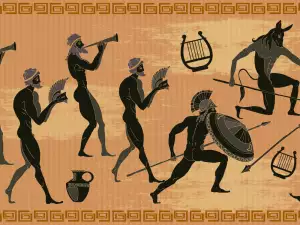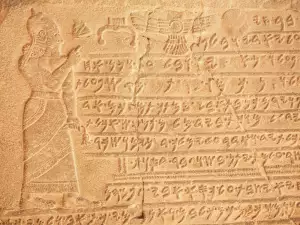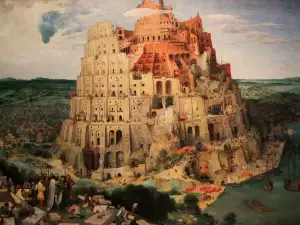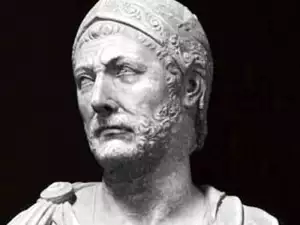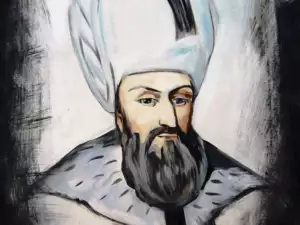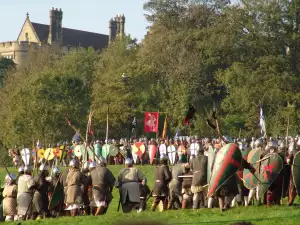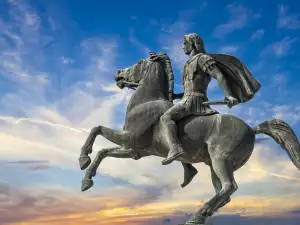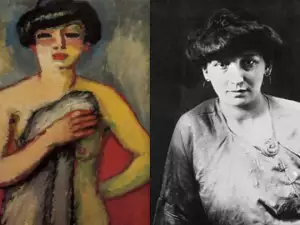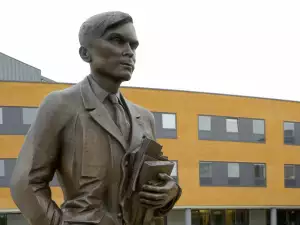Aristotle was an ancient Greek philosopher and scientist who is still considered one of the greatest thinkers in politics, psychology, ethics and philosophy. When Aristotle turned 17, he enrolled in Plato's Academy. In 338 he began training Alexander the Great. In 335, Aristotle founded his own school, the Lyceum, in Athens, where he spent most of his life studying, teaching and writing. Some of his most notable works are Nicomachean Ethics, Politics, Metaphysics, Poetics, and Preliminary Analysis.
Aristotle was born around 384 BC. In Stagira, a small town on the northern coast of Greece that was once a port.
Aristotle's Family, Early Life and Education
Aristotle's father, Nicomachus, was the court physician of the Macedonian king Amyntas II. Although Nicomachus died when Aristotle was a small boy, Aristotle remained closely associated with and influenced by Macedonia for the rest of his life. Little is known about his mother Festa - she is also believed to have died when Aristotle was young.
After the death of the father, Nicomachus Proxenus, who was married to Aristotle's older sister Arimnestes, became Aristotle's guardian until he came of age. When Aristotle turned 17, Proxenus sent him to Athens to pursue higher education. At that time, Athens was considered the academic center of the world. In Athens, Aristotle enrolled in Plato's Academy, the greatest Greek institution of learning, and proved himself an exemplary student. Aristotle maintained a relationship with the Greek philosopher Plato, who was a student of Socrates and his academy for two decades. Plato died in 347 BC. Because Aristotle disagreed with some of Plato's philosophical treatises, Aristotle did not inherit the position of director of the academy, as many had expected.
After Plato's death, Aristotle went to Macedonia to tutor Philip of Macedon's son, the then 13-year-old Alexander the Great. Philip and Alexander held on to Aristotle and ensured that the Macedonian court compensated him handsomely for his work. During his three-year stay there, Aristotle met and married his first wife, Pythias, the niece of King Ermias. Together, the couple has a daughter, Pythias, named after her mother. In 335 BC, the year Aristotle founded the Lyceum, his wife Pythia died. Soon after, Aristotle embarks on a romance with a woman named Herpylis, who comes from his hometown of Stagira. According to some historians, Herpylis may have been Aristotle's slave given to him by the Macedonian court. Presumably she was eventually released and he married her. Herpylis is known to have given birth to Aristotle's children, including his son named Nicomachus.
In 335 BC, after Alexander become king after his father and conquered Athens, Aristotle returned to the city. In Athens, Plato's Academy, ruled by Xenocrates, is still the leading institution of learning. With Alexander's permission, Aristotle opened his own school in Athens, called the Lyceum. Aristotle spent most of the rest of his life as a teacher, researcher and writer at the Lyceum in Athens, until the death of Alexander the Great. Members of the Athenian Lyceum wrote their discoveries in manuscripts. This way, they collected a huge collection of written materials of the school, which according to ancient accounts was considered one of the first great libraries.
When Alexander the Great died suddenly in 323 BC, the pro-Macedonian government was overthrown and in light of anti-Macedonian sentiment, Aristotle was accused of impiety for his association with his former student and the Macedonian court. To avoid persecution and execution, he left Athens and fled to Chalkida on the island of Euboea, where he remained until his death a year later.
The Books of Aristotle
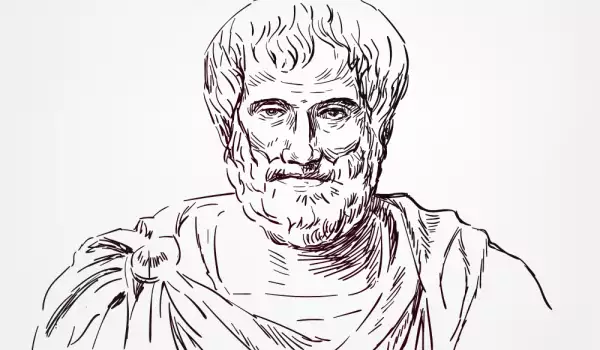
Aristotle wrote approximately 200 works, most in the form of notes and manuscripts, that touch on reasoning, rhetoric, politics, ethics, science, and psychology. They consist of dialogues, records of scientific observations and systematic works. His student Theophrastus, who is said to have taken care of Aristotle's writings, later passed them on to his student Neleus, who kept them in a vault to protect them from moisture and to keep them from being taken to ancient Rome and used by scientists there. Of Aristotle's approximately 200 works, only 31 have survived. Most date back to Aristotle's time at the Athenian Lyceum.
Poetics or On the Poetic Art
Poetics is a scientific study in which Aristotle observes, analyzes and defines tragedy and epic poetry. Compared to philosophy, which presents ideas, poetry is an imitative use of language, rhythm, and harmony that represent objects and events in the world. Tragedy and epos imitate better and more capable people, and comedy imitates those who are worse than the common man, argued Aristotle. Poetics consists of 26 untitled chapters and to this day it is not clear whether they were intended as a general treatise written by Aristotle or are notes of his lectures. The fact is, however, that the work brings out of the drama of which enters into relation to human nature.
Nicomachean Ethics and Eudaemic Ethics
These are works in which Aristotle sets out his views on morality: Eudemian Ethics, named after Eudemus - his student, and Nicomachean Ethics, named after his son Nicomachus. Apart from them, there is also a third book, the so-called Great Ethics. It is called great, because it unites in many respects the views set forth in the two other ethics. It is believed not to be among the works of Aristotle, but rather an extract from the two ethics, made by one of his students for the needs of lyceum studies.
In the Nicomachean Ethics Aristotle prescribes a moral code of conduct for what he calls the good life because the real world presents circumstances that may present a conflict of personal values. Instead, an individual must think cautiously as they develop their own judgment.
The Eudemian Ethics is Aristotle's treatise on the conduct and judgment that constitute the "good life".
On Happiness: In his treatises on ethics, Aristotle aims to discover the best way to live life and give it meaning - the best for man according to his words - which he defines as the pursuit of happiness. Our happiness is not a state but an activity and it is determined by our ability to live a life that allows us to use and develop our reason. While bad luck can affect happiness, a truly happy person learns to cultivate habits and behaviors that help them deal with bad luck in perspective.
The Golden Mean: Aristotle also defines what he calls the golden mean. Aristotle believed that the moral life was the ultimate goal. This means approaching any ethical dilemma by finding the middle ground between living in excess and living in deficit, taking into account the needs and circumstances of the individual.
Metaphysics
In his book Metaphysics Aristotle clarified the difference between matter and form. For Aristotle, matter is the physical essence of things, and form is the unique nature of something that gives it identity.
Politics
In Politics, Aristotle considered human behavior in the context of society and government. Aristotle believed that the purpose of government was to enable citizens to achieve virtue and happiness. Designed to assist leading statesmen and rulers, Politics explores, among other topics, the role of citizens and politicians; wealth and class system; the purpose of the political system; types of governments and democracies; the role of slavery and women in the household and society.
Rhetoric
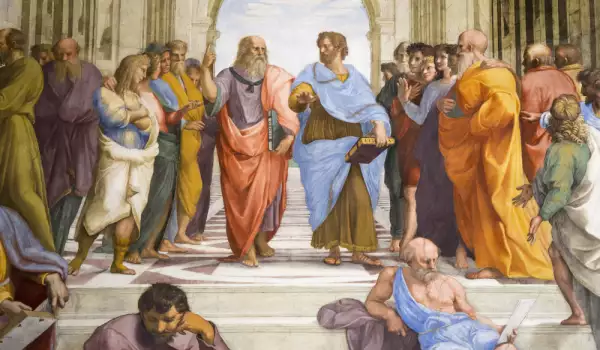
In Rhetoric, Aristotle observes and analyzes public speaking with scientific precision to teach readers how to be more effective speakers. Aristotle believed that rhetoric was essential in politics and law and helped to defend truth and justice. Good rhetoric, Aristotle believed, could educate people and encourage them to consider both sides of a debate. Aristotle's work explores how to construct an argument and maximize its effect, as well as avoid faulty logic.
Research Papers
Aristotle is the author of works on astronomy, On the heavens and Earth sciences and meteorology. His broader definition of meteorology includes: all experiences which we may call common to air and water, and the kinds and parts of the earth and the effects of its parts. In the Meteorology, Aristotle identifies the water cycle and discusses topics involving natural astrological events. Although many of his views of the Earth were controversial at the time, they were accepted and popularized in the late Middle Ages.
Philosophy
Aristotle's work on philosophy influenced ideas from late Antiquity throughout the Renaissance. One of the main directions of Aristotle's philosophy is his systematic concept of logic. Aristotle's goal was to devise a universal reasoning process that would allow man to learn anything possible about reality. The initial process involves describing objects based on their characteristics, states of being, and actions. In his philosophical treatises, Aristotle also discussed how one can obtain information about objects through deduction and inference. For Aristotle, deduction is a reasonable argument in which when certain things are determined, something else follows of necessity, because they are so. His theory of deduction is the basis of what philosophers now call a syllogism, logical argument and the conclusion is drawn from two or more other statements.
Will
Aristotle's influence on Western thought in the humanities and social sciences is considered incomparable, alongside the contributions of his teacher Plato and Plato's teacher Socrates. The long-standing academic practice of interpreting and discussing Aristotle's philosophical works continues to this day.

